-
 Bitcoin
Bitcoin $85,182.1560
0.15% -
 Ethereum
Ethereum $1,614.6954
0.75% -
 Tether USDt
Tether USDt $0.9999
0.00% -
 XRP
XRP $2.0839
-0.16% -
 BNB
BNB $594.4591
0.27% -
 Solana
Solana $140.8970
1.93% -
 USDC
USDC $1.0000
0.00% -
 Dogecoin
Dogecoin $0.1589
-0.40% -
 TRON
TRON $0.2429
0.57% -
 Cardano
Cardano $0.6310
-0.27% -
 UNUS SED LEO
UNUS SED LEO $9.3462
0.52% -
 Chainlink
Chainlink $13.0793
2.29% -
 Avalanche
Avalanche $19.9048
3.27% -
 Stellar
Stellar $0.2462
0.70% -
 Toncoin
Toncoin $3.0042
0.22% -
 Shiba Inu
Shiba Inu $0.0...01235
0.80% -
 Sui
Sui $2.1617
0.92% -
 Hedera
Hedera $0.1661
-0.88% -
 Bitcoin Cash
Bitcoin Cash $340.0235
0.83% -
 Polkadot
Polkadot $3.9397
5.62% -
 Hyperliquid
Hyperliquid $18.3932
4.07% -
 Litecoin
Litecoin $76.6373
0.19% -
 Bitget Token
Bitget Token $4.5867
2.80% -
 Dai
Dai $0.9999
0.00% -
 Ethena USDe
Ethena USDe $0.9991
0.00% -
 Pi
Pi $0.6505
0.33% -
 Monero
Monero $216.7995
2.12% -
 Uniswap
Uniswap $5.3424
1.66% -
 Pepe
Pepe $0.0...07501
2.72% -
 OKB
OKB $50.8786
0.10%
Bitcoin vs Ethereum: Core Differences and Investment Options
Bitcoin, launched in 2009, aims to be digital gold, while Ethereum, introduced in 2015, supports smart contracts and DApps, offering diverse investment options.
Apr 17, 2025 at 12:50 am
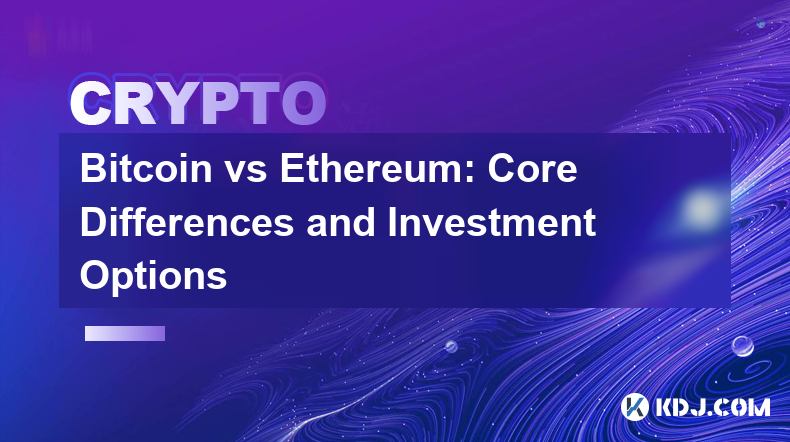
Bitcoin and Ethereum are two of the most prominent cryptocurrencies in the market, each with its unique features and investment potential. Understanding the core differences between these two digital assets is crucial for any investor looking to diversify their portfolio. This article will delve into the fundamental distinctions between Bitcoin and Ethereum, as well as explore the various investment options available for each.
Origins and Purpose
Bitcoin, launched in 2009 by an anonymous person or group known as Satoshi Nakamoto, was created as a decentralized digital currency to serve as an alternative to traditional financial systems. Its primary purpose is to facilitate peer-to-peer transactions without the need for intermediaries like banks. Bitcoin's design focuses on being a store of value, often referred to as "digital gold."
On the other hand, Ethereum was introduced in 2015 by Vitalik Buterin and aims to be more than just a cryptocurrency. Ethereum is a decentralized platform that enables developers to build and deploy smart contracts and decentralized applications (DApps). Its native cryptocurrency, Ether (ETH), is used to pay for transaction fees and computational services on the Ethereum network.
Technology and Consensus Mechanism
Bitcoin operates on a blockchain, a distributed ledger that records all transactions across a network of computers. It uses a Proof of Work (PoW) consensus mechanism, where miners compete to solve complex mathematical problems to validate transactions and add them to the blockchain. This process is energy-intensive but provides a high level of security and decentralization.
Ethereum also uses a blockchain but initially employed a PoW consensus mechanism similar to Bitcoin. However, Ethereum is in the process of transitioning to Proof of Stake (PoS) with its Ethereum 2.0 upgrade. In PoS, validators are chosen to create new blocks based on the number of coins they hold and are willing to "stake" as collateral. This shift is expected to reduce energy consumption and increase scalability.
Supply and Inflation
Bitcoin has a capped supply of 21 million coins, a feature designed to mimic the scarcity of precious metals like gold. This fixed supply is intended to protect Bitcoin's value against inflation over time. As of now, over 19 million Bitcoins have been mined, with the remaining coins expected to be mined by around 2140.
In contrast, Ethereum does not have a fixed supply cap. Initially, Ethereum had an annual inflation rate, but with the transition to Ethereum 2.0, the issuance of new Ether is expected to decrease significantly. The exact future supply of Ether will depend on the network's adoption and the effectiveness of the PoS mechanism.
Use Cases and Ecosystem
Bitcoin's primary use case is as a store of value and a means of peer-to-peer payment. It is widely accepted as a form of payment by various merchants and can be used for remittances and as a hedge against inflation. The Bitcoin ecosystem includes various wallets, exchanges, and payment processors that facilitate its use.
Ethereum, however, offers a broader range of use cases due to its support for smart contracts and decentralized applications. Smart contracts are self-executing contracts with the terms directly written into code, enabling trustless and automated transactions. The Ethereum ecosystem is vast, with thousands of DApps spanning finance, gaming, art, and more. Notable examples include decentralized finance (DeFi) platforms like Uniswap and non-fungible token (NFT) marketplaces like OpenSea.
Investment Options
Investors interested in Bitcoin have several options to consider. They can purchase Bitcoin directly from cryptocurrency exchanges like Coinbase or Binance. For those looking for more passive investment, Bitcoin exchange-traded funds (ETFs) and investment trusts like the Grayscale Bitcoin Trust (GBTC) are available in some regions. Additionally, investors can participate in Bitcoin mining, either by running their own mining rigs or joining mining pools.
For Ethereum, investment options are similarly diverse. Investors can buy Ether directly from exchanges or invest in Ethereum-based projects and tokens through decentralized exchanges (DEXs) like Uniswap. Ethereum also offers staking opportunities, where investors can lock up their Ether to participate in the validation process and earn rewards. For those interested in the broader Ethereum ecosystem, investing in DeFi projects or NFTs can provide exposure to the platform's growth.
Market Performance and Volatility
Both Bitcoin and Ethereum have experienced significant growth and volatility since their inception. Bitcoin has often been seen as a more stable investment due to its established position in the market and its role as a store of value. However, it is not immune to price fluctuations, with events like regulatory changes and macroeconomic factors influencing its value.
Ethereum, on the other hand, tends to be more volatile due to its broader range of use cases and the rapid development of its ecosystem. The price of Ether can be influenced by factors such as the adoption of DeFi and NFTs, as well as the progress of Ethereum 2.0. While this volatility can present higher risk, it also offers the potential for higher returns.
Regulatory Environment
The regulatory environment for cryptocurrencies varies significantly by country, and both Bitcoin and Ethereum are subject to these regulations. Bitcoin has been around longer and has faced more regulatory scrutiny, with some countries like El Salvador adopting it as legal tender, while others have imposed strict regulations or outright bans.
Ethereum faces similar regulatory challenges, but its broader use cases mean it is often subject to additional scrutiny, particularly in areas like DeFi and NFTs. Regulatory developments can significantly impact the adoption and value of both cryptocurrencies, making it essential for investors to stay informed about the regulatory landscape in their region.
Frequently Asked Questions
Q: Can I use Bitcoin and Ethereum interchangeably for transactions?
A: While both Bitcoin and Ethereum can be used for transactions, they are not interchangeable. Bitcoin is primarily used as a store of value and for peer-to-peer payments, whereas Ethereum is used for a broader range of applications, including smart contracts and DApps. The transaction fees and processing times also differ between the two.
Q: How do the transaction fees compare between Bitcoin and Ethereum?
A: Transaction fees for Bitcoin can vary widely depending on network congestion, but they are generally higher than those for everyday transactions. Ethereum's transaction fees, known as gas fees, can also fluctuate based on network demand, particularly with the popularity of DeFi and NFTs. However, Ethereum's upcoming upgrades aim to reduce these fees.
Q: Are there any risks associated with investing in Bitcoin and Ethereum?
A: Yes, investing in cryptocurrencies like Bitcoin and Ethereum carries several risks, including market volatility, regulatory changes, and potential security breaches. It's important for investors to conduct thorough research and consider their risk tolerance before investing.
Q: How can I store Bitcoin and Ethereum securely?
A: Both Bitcoin and Ethereum can be stored in digital wallets, which come in various forms such as software wallets, hardware wallets, and paper wallets. Hardware wallets like Ledger and Trezor are considered the most secure option for long-term storage, as they store private keys offline. It's crucial to follow best practices for wallet security, such as using strong passwords and enabling two-factor authentication.
Disclaimer:info@kdj.com
The information provided is not trading advice. kdj.com does not assume any responsibility for any investments made based on the information provided in this article. Cryptocurrencies are highly volatile and it is highly recommended that you invest with caution after thorough research!
If you believe that the content used on this website infringes your copyright, please contact us immediately (info@kdj.com) and we will delete it promptly.
- Dogecoin’s Next Move: Surge to $0.90 or More Sideways Pain?
- 2025-04-20 12:55:13
- Philadelphia Eagles enter Super Bowl LIX as slight underdogs to the Kansas City Chiefs
- 2025-04-20 12:55:13
- Bitcoin has risen dramatically over the last 10 years against gold
- 2025-04-20 12:50:12
- TRUMP cryptocurrency, the meme coin named after President Donald Trump, rose more than 8 percent
- 2025-04-20 12:50:12
- HYPE Recovers, Pi Aims for $3, But BlockDAG Could Deliver the Real 100X—Top Cryptos to Watch Now
- 2025-04-20 12:45:13
- As Consensus 2025 Inches Closer, a Buzz is Swelling in the Pi Network Ecosystem
- 2025-04-20 12:45:13
Related knowledge

How to buy and sell Bitcoin using a P2P platform?
Apr 18,2025 at 05:57pm
Buying and selling Bitcoin using a P2P (peer-to-peer) platform can be an efficient way to trade cryptocurrencies directly with other individuals. This method offers flexibility, often lower fees, and the ability to use various payment methods. In this article, we will walk through the process of buying and selling Bitcoin on a P2P platform, ensuring you...
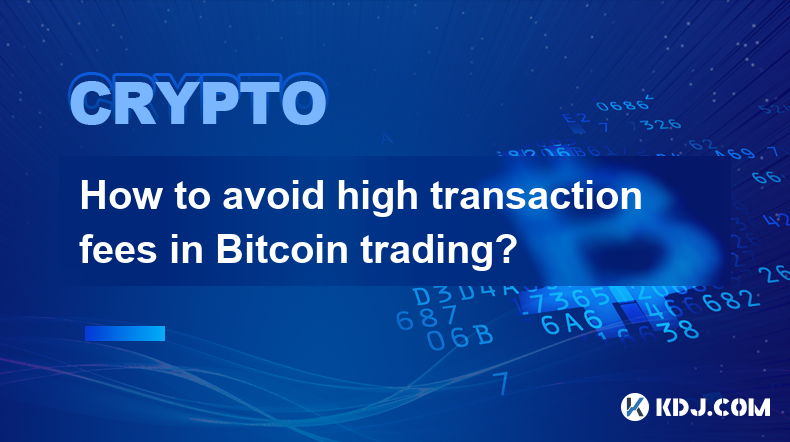
How to avoid high transaction fees in Bitcoin trading?
Apr 18,2025 at 12:14am
How to Avoid High Transaction Fees in Bitcoin Trading? Bitcoin trading can be exciting, but high transaction fees can quickly erode your profits. Understanding how to minimize these fees is crucial for any trader looking to maximize their returns. In this article, we will explore various strategies and techniques to help you avoid high transaction fees ...
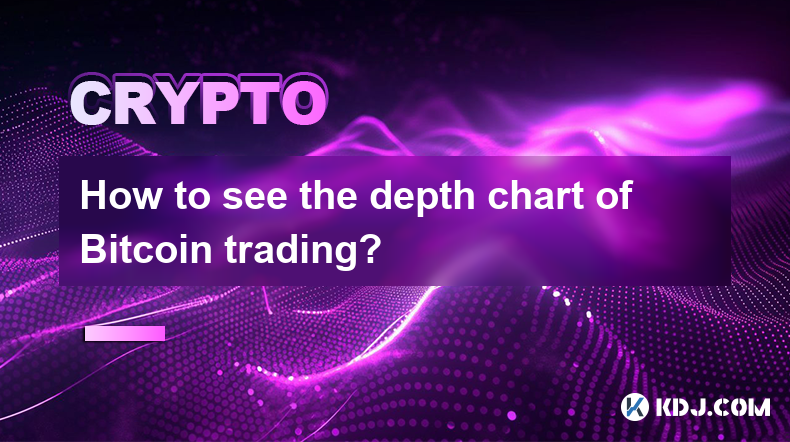
How to see the depth chart of Bitcoin trading?
Apr 17,2025 at 08:36am
Understanding the depth chart of Bitcoin trading is crucial for any serious cryptocurrency trader. The depth chart provides a visual representation of the supply and demand for Bitcoin at various price levels, helping traders make informed decisions about when to buy or sell. In this article, we will guide you through the process of accessing and interp...
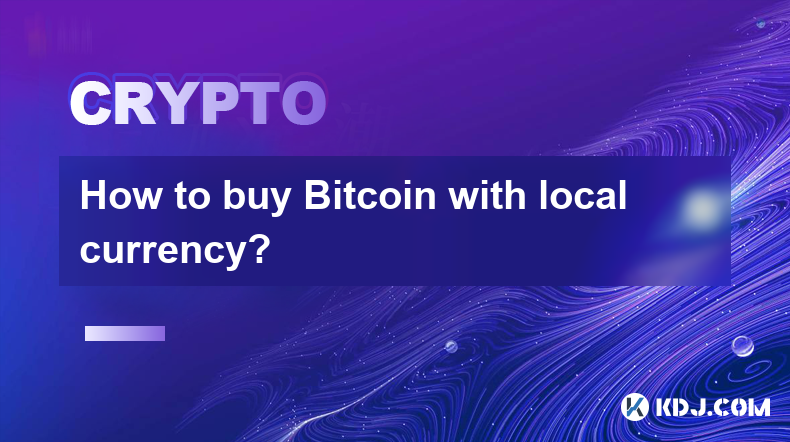
How to buy Bitcoin with local currency?
Apr 18,2025 at 01:22am
Buying Bitcoin with local currency is a straightforward process that allows you to enter the world of cryptocurrencies using your familiar fiat money. Whether you are a beginner or an experienced investor, understanding the steps to acquire Bitcoin with your local currency can help you make informed decisions and manage your investments effectively. In ...

What is the Lightning Network in Bitcoin trading?
Apr 19,2025 at 02:35am
The Lightning Network is a second-layer scaling solution designed to enhance the speed and efficiency of Bitcoin transactions. It operates as an off-chain network that allows users to conduct multiple transactions without the need to settle each one individually on the Bitcoin blockchain. This significantly reduces transaction fees and speeds up the pro...
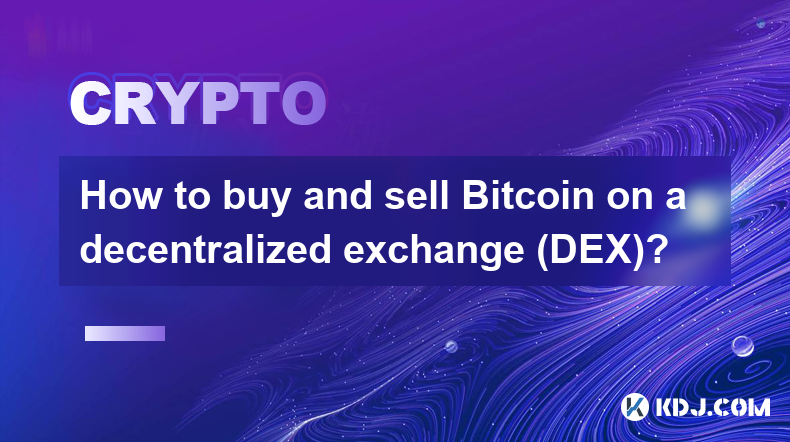
How to buy and sell Bitcoin on a decentralized exchange (DEX)?
Apr 18,2025 at 02:42am
Buying and selling Bitcoin on a decentralized exchange (DEX) offers a different experience compared to traditional centralized exchanges. DEXs provide more privacy and control over your funds, as they allow you to trade directly with other users without an intermediary. This guide will walk you through the process of buying and selling Bitcoin on a DEX,...

How to buy and sell Bitcoin using a P2P platform?
Apr 18,2025 at 05:57pm
Buying and selling Bitcoin using a P2P (peer-to-peer) platform can be an efficient way to trade cryptocurrencies directly with other individuals. This method offers flexibility, often lower fees, and the ability to use various payment methods. In this article, we will walk through the process of buying and selling Bitcoin on a P2P platform, ensuring you...

How to avoid high transaction fees in Bitcoin trading?
Apr 18,2025 at 12:14am
How to Avoid High Transaction Fees in Bitcoin Trading? Bitcoin trading can be exciting, but high transaction fees can quickly erode your profits. Understanding how to minimize these fees is crucial for any trader looking to maximize their returns. In this article, we will explore various strategies and techniques to help you avoid high transaction fees ...

How to see the depth chart of Bitcoin trading?
Apr 17,2025 at 08:36am
Understanding the depth chart of Bitcoin trading is crucial for any serious cryptocurrency trader. The depth chart provides a visual representation of the supply and demand for Bitcoin at various price levels, helping traders make informed decisions about when to buy or sell. In this article, we will guide you through the process of accessing and interp...

How to buy Bitcoin with local currency?
Apr 18,2025 at 01:22am
Buying Bitcoin with local currency is a straightforward process that allows you to enter the world of cryptocurrencies using your familiar fiat money. Whether you are a beginner or an experienced investor, understanding the steps to acquire Bitcoin with your local currency can help you make informed decisions and manage your investments effectively. In ...

What is the Lightning Network in Bitcoin trading?
Apr 19,2025 at 02:35am
The Lightning Network is a second-layer scaling solution designed to enhance the speed and efficiency of Bitcoin transactions. It operates as an off-chain network that allows users to conduct multiple transactions without the need to settle each one individually on the Bitcoin blockchain. This significantly reduces transaction fees and speeds up the pro...

How to buy and sell Bitcoin on a decentralized exchange (DEX)?
Apr 18,2025 at 02:42am
Buying and selling Bitcoin on a decentralized exchange (DEX) offers a different experience compared to traditional centralized exchanges. DEXs provide more privacy and control over your funds, as they allow you to trade directly with other users without an intermediary. This guide will walk you through the process of buying and selling Bitcoin on a DEX,...
See all articles























































































